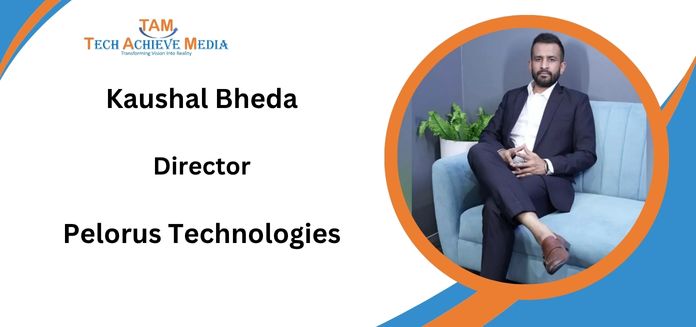In the years following the 26/11 attacks, India recognized the urgent need for stronger, technology-driven intelligence and surveillance systems. Founded in this backdrop, Pelorus Technologies has emerged as a key player in unifying digital forensics, intelligence, and surveillance under one cohesive framework. In an exclusive conversation with Tech Achieve Media, Kaushal Bheda, Director of Pelorus Technologies, discusses how the company is bridging critical gaps in digital defense, leveraging AI for investigative efficiency, addressing drone-related threats, and building collaborative ecosystems that strengthen national security.
TAM: Pelorus was founded in the aftermath of 26/11. Since defense is dominated by large players and the government, what were the gaps that Pelorus identified to enter and make an impact?
Kaushal Bheda: The defense sector is largely occupied by big players, but we focus on the intelligence and surveillance side. Think of it as a mother–daughter relationship: defense builds the missiles, while intelligence tells you where to hit. India, being a large nation, faces countless issues in crime and cyberattacks, especially after the Digital India initiative. The ecosystem was fragmented, with multiple players working in silos. Pelorus was formed to bring structure to this space and unify digital forensics, intelligence, and surveillance under a cohesive framework. That is where our strength lies.
TAM: What were some of the early challenges Pelorus faced in creating homegrown digital forensics and surveillance systems?
Kaushal Bheda: I joined about a year and a half ago, but I know the founder’s journey well. Back in 2008 and 2009, the company’s original plan was quite different. In fact, the name Pelorus came from a naval requirement. However, as the company evolved, we noticed a huge gap in digital forensics. Real crimes were not being investigated effectively because the available tools were inadequate. That was when Pelorus pivoted to fill this gap, and over time, we became leaders in this field. Today, we operate like an orchestra, with multiple components working together across forensics, surveillance, and intelligence.
TAM: How are current geopolitical tensions shaping Pelorus’ approach to drone threat detection and aerial cybersecurity?
Kaushal Bheda: Drones have completely redefined warfare. Look at operations such as Spiderweb by Ukraine or Rising Lion by Israel. Attacks can now come from within a country, not just across borders. This means cities and towns must build protective “bubbles” around critical assets, whether human, infrastructural, or digital. Future safe-city planning will have to include counter-drone and aerial cyber defense measures as integral components of national security.
TAM: How integral is Artificial Intelligence to Pelorus’ operations, especially with the rise of predictive analytics?
Kaushal Bheda: AI is a massive enabler. Of course, it is not used everywhere. For example, not in evidentiary or court documents where data must remain verifiable but when it comes to big data, AI is indispensable. Earlier, investigators dealt with gigabytes of data; today, it’s terabytes per person across multiple devices. Without AI, investigators would be overwhelmed. AI acts as a force multiplier, performing tasks that once took days in just minutes. It is transforming both the speed and quality of investigations for law enforcement agencies.
TAM: Could you share details about Pelorus’ partnerships or deployments that highlight your capabilities?
Kaushal Bheda: We work with several best-of-breed OEMs globally and in India, such as:
- Cellebrite, a world leader in mobile forensics.
- Pi-Labs, which specializes in deepfake detection for video and audio and is part of a Make-in-India initiative.
- OPSWAT, which focuses on malware and threat prevention.
Alongside these, we partner in areas like cryptocurrency investigations, malware analysis, and computer forensics, covering the entire spectrum of digital investigation.
TAM: How does Pelorus plan to scale and expand operations going forward?
Kaushal Bheda: We are at a very exciting juncture, and the cusp of exponential growth. Governments have realized the importance of investing in investigation and cyber defense. We have built expertise and strong relationships over the years, and now the demand is rising organically.
We are also expanding into new areas such as cryptocurrency fraud detection, financial cybercrime prevention, and anti-drone systems. Our focus is on staying ahead of emerging threats through strong OEM collaborations and continuous in-house innovation.
TAM: Which industries or government bodies are you currently serving?
Kaushal Bheda: We primarily work with government agencies including law enforcement, intelligence, the enforcement directorate, income tax, and others. Each has a unique mandate, and we tailor solutions for their specific problem statements.
Some projects use OEM solutions, while others are developed entirely by our local R&D team to address specialized investigative needs.
TAM: What drives your work personally and as a company in this space?
Kaushal Bheda: This field is not just about business or numbers, but it is about patriotism and contributing to national safety. There is immense satisfaction in knowing that our technology helps solve real crimes and protects citizens. It is deeply fulfilling to see tangible impact from our work.
TAM: Finally, where do you see the biggest opportunities for collaboration between the government and private players in building a secure, self-reliant digital defense ecosystem?
Kaushal Bheda: The Public-Private Partnership (PPP) model works beautifully here. Companies like ours interact with both ends, and the global OEMs developing cutting-edge technology and Indian government agencies defining local challenges. We sit in the sweet spot between both, bridging the innovation from private players and the operational needs of national security bodies. That is where real progress happens.







